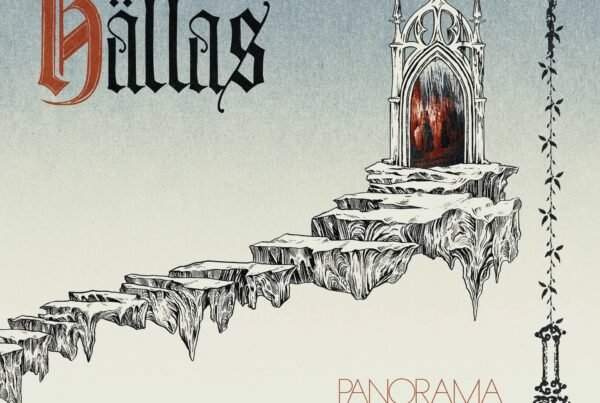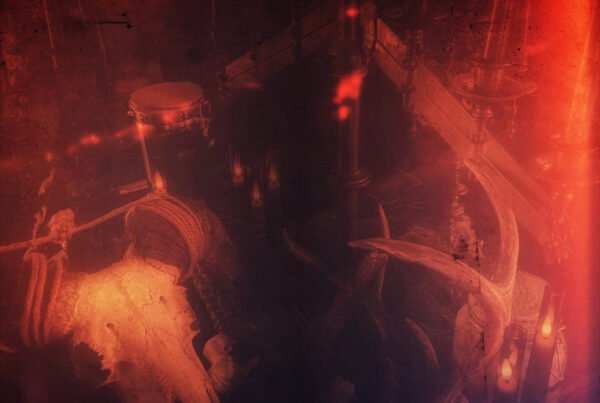The Smothering Arms of Mercy – besides being an extremely solid and mature debut – it is also a harrowing, uncompromising, and insanely heavy journey.
Release date: December 4, 2020 | Wild Thing Records | Facebook | Bandcamp | Website
Welcome to one of our not-so-common joint reviews. Following up with our new format, where such a review takes the form of a chat, me and Eeli are going to be dissecting this monstrous record. Before we delve into the matter at hand, I’d like to offer a little background on what we’re going to discuss. Growth began as a reflective space for brothers Tristan Barnes (guitars/bass/artwork) and Nelson Barnes (drums) in Melbourne, Australia, each having spent a decade separate and pursuing music overseas. Upon returning to Australia to come to terms with his personal demons and receiving a mental health diagnosis that hit with closure and terror all at once, Tristan became a recluse – isolated, debilitated, and expressing his pain through writing. Meanwhile, vocalist Luke Frizon had withdrawn from life to enter a period of recovery after reaching rock bottom, seeking to reconnect with himself and make meaning of hopelessness, trauma, and loss.
A chance meeting on a mutual first outing from respective isolation sparked a discussion about the empathic aspects of music and quickly led to a partnership. With the lineup rounded out, the trio set out to create music that explored the human aspects of connection, trauma, despair, and the fragility of hope. The result is their debut album, The Smothering Arms of Mercy, a claustrophobic narrative of total spiritual collapse written while in psychiatric care and thrown over nine suffocating acts. This marks the first part of a trilogy aimed at going beyond expressing emotion, illustrating pathways of recovery while acknowledging the most dread-filled aspects of it. Alright, without further ado, here it goes.
Eeli: Hey Rob, how are you?
Robert: Hey Eeli, I’m good, I’ve been looking into disassembling the rear hub on my bike and YouTube tutorials are utter garbage. How about you?
E: Understandable. I’m plowing through mortal chores, i.e. work, stuck at my home office, bearing along with the pandemic related restrictions and what not. But good overall.
R: Yeah, that sounds about right. It’s unfortunately quite relatable.
E: So how about that Growth? Why did it pique your interest in the first place? I hadn’t really heard about them anywhere prior to you suggesting we review them together. Though, I have to say that with a mundane name like that, it’s not a surprise if I just don’t recall them, even if I saw them pop up somewhere earlier.
R: Yeah me neither, there have to be like at least a dozen bands with that name. Apparently The Smothering Arms of Mercy is their debut album. I was immediately curious when Inter posted the single in the group saying that it’s AOTY material. Then I saw that it’s on the review list and that the comment simply said ‘cool Gojira vibes’. After listening to the single, “Cigarette Burns”, I was basically sold.
E: Oh yeah, I saw that mention about Gojira-esqueness too. Although it piqued my interest, I was still slightly nervous going into the first single, knowing that the parabolic act has sort of gone bland in recent years. But alas, I didn’t really even catch the similarities between the two at first, instead I just got really pumped about Growth altogether.
R: I mean yeah this was my initial ignition, but eventually I also got hyped about Growth as they are. I really had to dig deep into the record to understand where is all the familiarity coming from. It has that unrelenting energy and highly angular character that’s basically the hallmark of Ulcerate, on top of that there’s something about the riffs and the drumming in certain segments that hearkens heavily to early/mid 2010s Car Bomb, and finally I got the Gojira vibes which I honestly can’t pin down to any particular part. I think it’s something of an atmosphere/mood sort of element and similitude.
E: Interesting. If I had to draw comparisons, I would’ve picked the technically pervasive aspects which echo the likes of Rivers of Nihil and the dynamics brought Hypno5e to mind, albeit Growth have a way more deathy approach. However, the kindred avant-garde spirit is present throughout the album. While there’s certainly a reminiscence to those bands, I think Growth really bases their writing on drive and groove, even more than the mentioned actually.
R: Huh, I would’ve never figured to compare them to Rivers of Nihil and Hypno5e, but now that you mention it, that also makes sense as a parallel. Yeah, they definitely focus more on groove than the aforementioned and if by drive you mean their absolutely pummeling and uncompromising delivery – yes – I wholeheartedly agree.
E: Yeah, that’s exactly what I mean. While speaking about dynamics, one thing that really made The Smothering Arms of Mercy a fascinating journey was Growth‘s ability to marry that pummeling and uncompromising heaviness with soft and atmospheric passages, almost appearing fragile at times. It’s interesting how they manage to bring those rather distant aspects together so fluently.
R: I can most definitely subscribe to that. I’m tempted to draw a parallel with mid 2000s Opeth in the way of said dynamics, mainly because of how the mood of the atmosphere remains rather unchanged across the heavy and the soft parts. If anything, it becomes somewhat more unsettling in the softer parts. Of course, it’s a great feat of songwriting and overall composition that many attempt, but few manage to do it with such a sense of balance and authenticity. Although, in spite of the dynamics at play it feels like the consistency of the material almost got too solid. You know that double-edged sword of consistency, where if it’s too loose it doesn’t come together, and if it’s too tight or even, it’s monotonous. Growth did manage though to stray away from the monotony – I’d like to note that marginally though. I wouldn’t say it was accidental, but rather a controlled idea within the context of the album to better illustrate the concept of mental issues.
E: I wouldn’t go as far as blaming them for being monotonous either, but I understand where you’re coming from. The atmospheric consistency is actually something I didn’t really grasp until now that you mentioned it. Also, I agree, it’s certainly controlled with that in mind. The concept is definitely mirrored compositionally and I think it works wonders. The only downside of the cohesiveness though, is that even though the album is mighty strong as it is, it can be a tiring experience to listen through in one sitting. Not necessarily tiring as in making you feel dull or bad per se, but it can be exhausting.
R: Agreed, I also am not going to lie, it was a pretty draining experience. It was as demanding to listen to as the new Imperial Triumphant. Definitely not digestible nor easy listening.
E: Definitely not. But only once you’re in that mindset and acceptive state, I think that The Smothering Arms of Mercy does actually properly open up to the listener.
R: It’s definitely something to ruminate over at length. There are also a lot of details that just sat invisibly until my third time around it. It just suddenly hit me that the record just booms with bass – not in a bad way mind you – it almost made me think that metal bands in general don’t care about properly mixing and refining the low end. Funnily enough, just about then it also dawned on me that these guys have really mad chops. I mean that should’ve been immediately obvious. I guess I got too accustomed to the way highly technical bands play and simply glazed over that. I also noticed that the latter half of the album goes so much harder than the rest, particularly the last three songs. They are just frothing at their seams with a truly wild attitude.
E: Exactly! The string from “Soul Rot” to “Gird Your Loved In Armour While Yet You Wither” is absolutely impeccable. I think placing these particular tracks to the end is an odd move, considering they easily beat the others in terms of the wildness you mentioned. That’s a lot said, considering that I wouldn’t characterize the others tame by any means. But yes, the tunes begin to burst at their seams throughout those closing tracks. I also share the sentiment about the bass department, I love the fact that Growth are embracing the low frequencies in such a compelling manner as they are.
R: I think it’s a very appropriate move. So many bands close on a weak note or with some totally unsatisfying result. Listening to The Smothering Arms of Mercy, you’re basically pummeled with brick after brick after brick and at the end an entire wall of bricks is dropped on you. I mean, in my opinion, that’s what metal should be like in a lot of cases (if not all). Speaking of the bass, I’m very surprised about how clean and articulate it is while having the weight it has. I also have to give a shoutout to whoever was responsible with recording and polishing the drums, they sound insanely good – which is another issue I have with a lot of albums. The guitar tones are also very compelling, the bass tone more so for me, in this particular case, as it has such a madly satisfying metallic twang. The vocals are also captured very well. Extraordinary recording, mixing and mastering quality, ultra pristine and sharp without being sterile. They (whoever did all this) should teach a masterclass about this kind of stuff.
E: Yes, the mix is fantastic throughout. I think that, that alone should push this album onto everyone’s radar, not to mention the songwriting chops and technical prowess. About the track order, while the closers are on an entirely new level as far as I’m concerned, there’s heavy hitters at the beginning as well, like “Fortress of Flesh and Bone” and “Our Lady of the Hanging Heart”, but those ramble around the vast musical scope in a more controlled pace. I could’ve envisioned them being placed towards the end due to their overall mood, which carries a lot of emotional punch. But you know, I’m sure the band is aware of this and have tweaked the track order with that in mind; to keep the album’s flow refreshing and different in its own way. After all, nothing on the album sounds random or inconsiderate, so something as significant as that just has to be based on a lot of thought and contemplation.
R: Most definitely so. It is a highly deliberate and meticulously planned output. I just love it when that kind of intent and craft simply oozes through the tune. It’s also clear – to me at least – that this wasn’t a spur of the moment type of inspiration or a happy accident. Everything feels like it went through a lot of modifications and iterations until it finally reached the end product. It’s kind of like a piece of charcoal that was heavily fucked under the earth’s crust in order to yield a diamond, which itself underwent another round of heavy modifications to appear as perfect as it is in a display case.
E: Absolutely, I have no doubts about that whatsoever. Musicianship and writing of this caliber just doesn’t happen by itself. While everything sounds deliberate, nothing feels forced or sterile, you know? I think a lot of bands today struggle with the latter, but that’s certainly not the case here.
R: Yeah it’s quite an achievement to think something out in such detail and modify it so many times while maintaining a highly organic feeling. I think this especially applies to the metal corner.
E: It does, yes. In that sense, Growth are very much singular, apart from their name though, but maybe we’ve given them enough of a hard time about that.
R: Hahaha, yeah, it’s fine though, I’m sure that with this and subsequent releases the name will have its connotations dramatically shifted.
E: No doubt. Mind you, it could be far worse as well.
R: Oh, I think neither of us needs a reminder for that. Alright, I think we pretty much turned the record upside down in every dimension. I’m all tapped out. How about you? Would you like to add something else?
E: Not really. I think I’ve managed to word all the coherent thoughts I have of it for now. In conclusion, I’ll just say that the album and all its contents are monumental, profound, and amazing pieces of art. Music which will hopefully find its way to the earholes of every damn person on this planet.
R: Hahaha, I can subscribe to that, well put.






